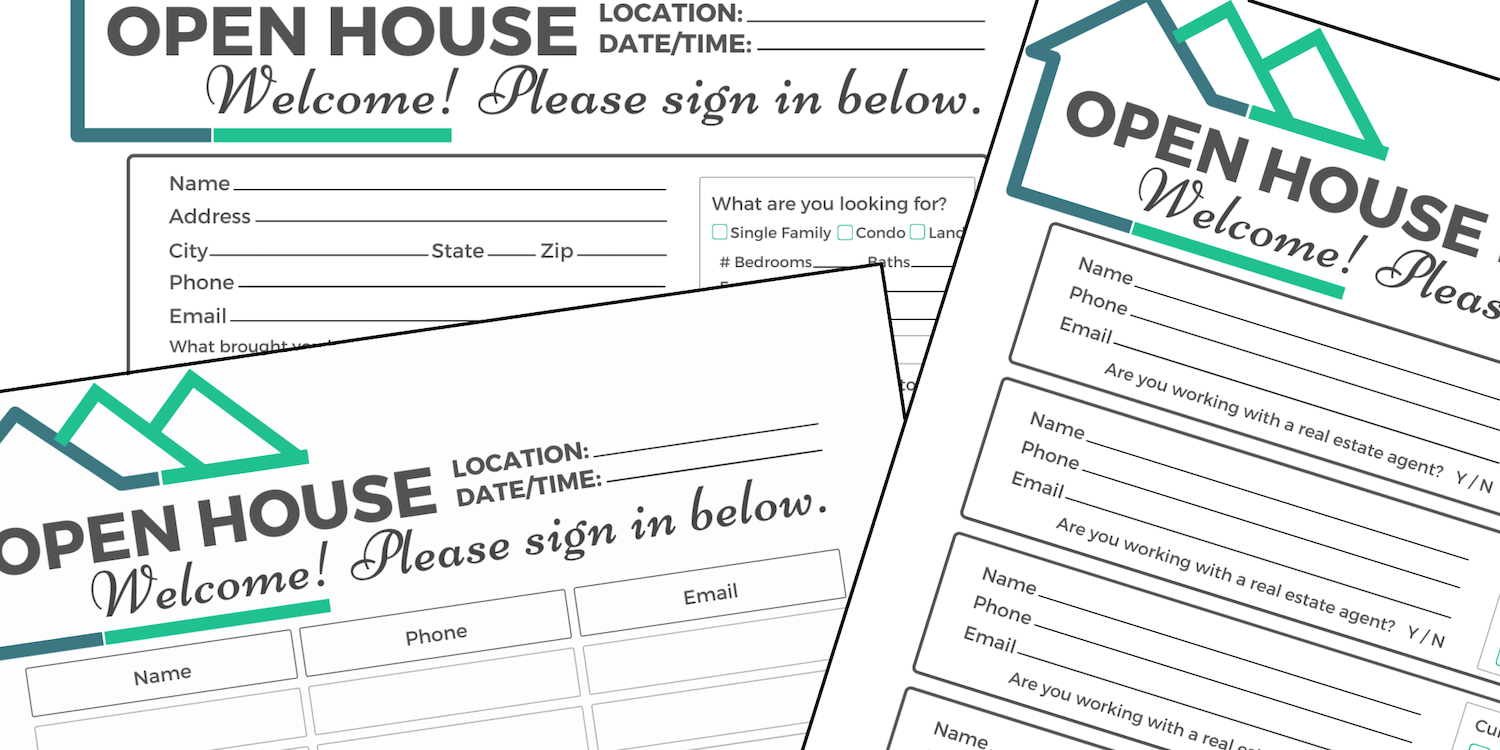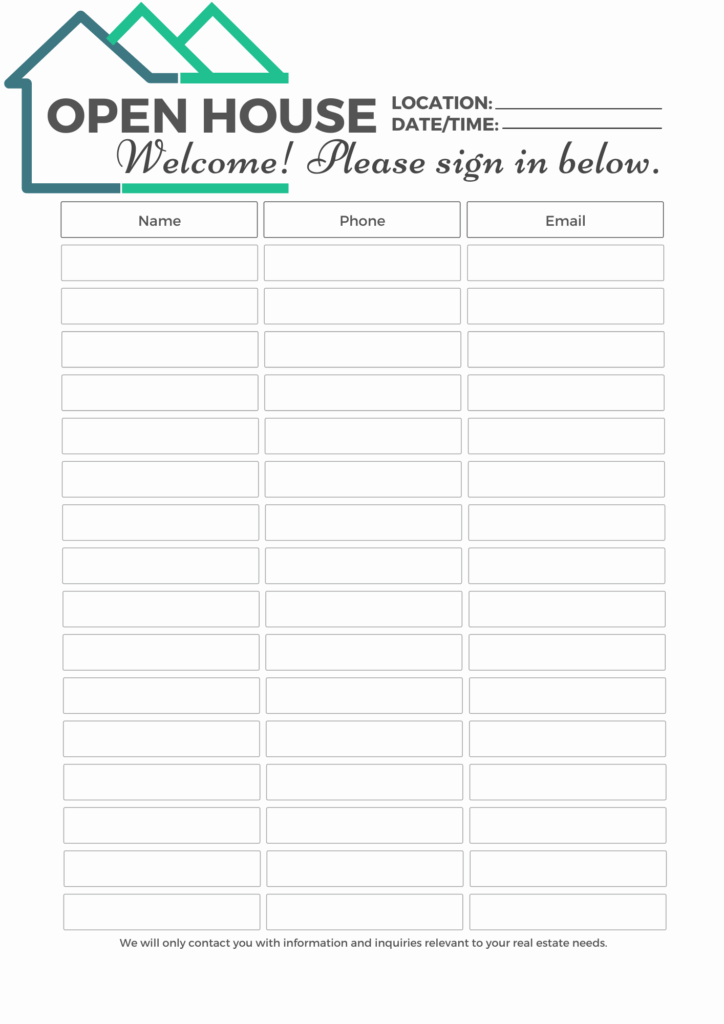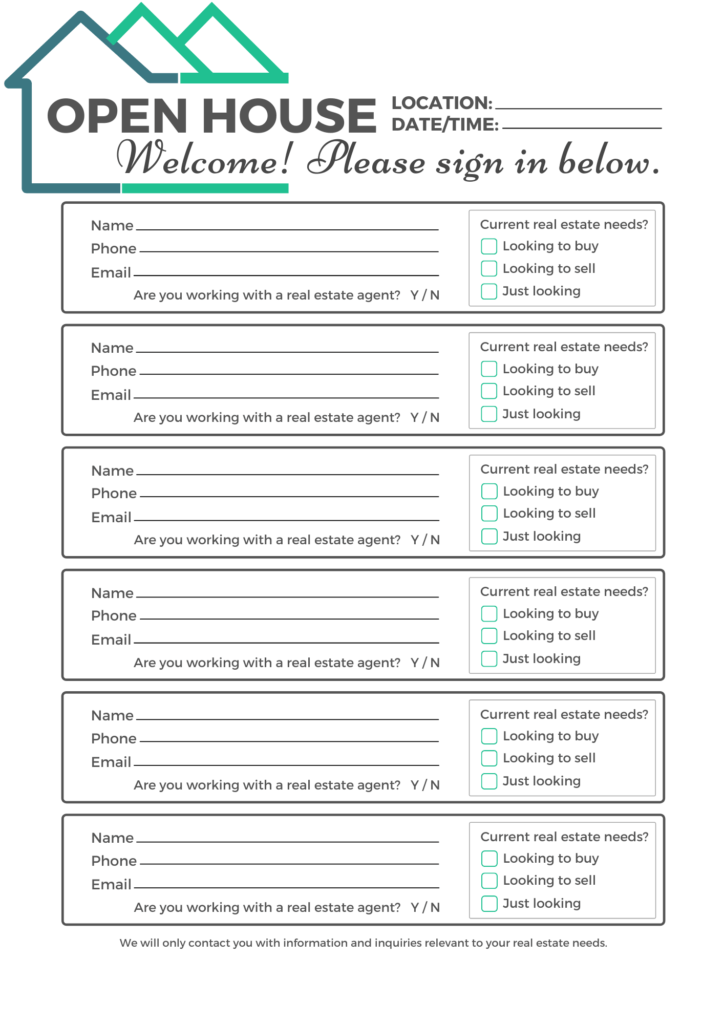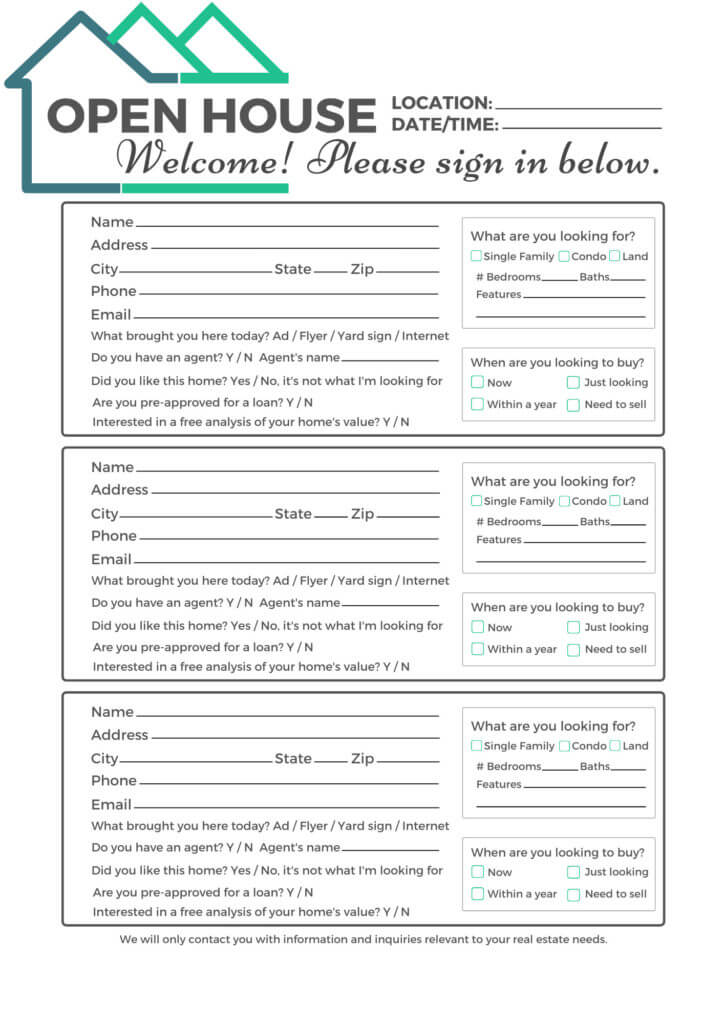
Real estate open houses not only sell homes, they’re also one of the best sources for buyer and seller leads.
Think about it — where else besides an open house can you meet dozens of local active buyers, many of whom don’t yet have an agent, and who also may need to sell a property?
Open houses are a win–win situation for you as an agent, but a lot of your success will depend on whether you are able to properly capture these leads with an open house sign-in sheet. And herein lies the problem.
It can be a hassle to put together your own sign-in sheet from scratch. A variety of templates are available, but then the question becomes which one to use. Not to mention, you still need to ensure visitors to your open house will fill it out.
With so much riding on your sign-in sheet, it’s great to have a bit of extra help. We’ve put together three free open house sign-in sheet templates that you can use for your next open house, along with tips to help you choose the right one to suit your needs.
Get ready to find your next client with these printable open house sign-in sheet PDFs.
3 Important Points About Capturing Real Estate Leads With Sign-Ins
Before you print out a stack of sign-in sheets and head to your next open house, here’s a few quick but important points to keep in mind.
1. Open houses are primarily about leads, not listings.
Most open houses don’t lead to sales. Research shows only about 6% of home sales come directly from an open house.
While you may want to spare your listing clients this detail, it’s important to realize that open houses aren’t what they used to be.
Most buyers (93%) are not longer piling in the station wagon with the Sunday paper for a day of open houses, but instead shopping at home over the internet.
This means that open houses are primarily a lead generation tool.
Yes, it’s true that photos of a open house full of visitors is great marketing for your listing, but it’s the conversations with the neighbors and first-time sellers that eventually list with you to pay attention to.
2. A good sign-in sheet can make all the difference.
The right open house sign-in sheet can really impact your success as an agent. A sheet is your best opportunity to get a list of active and local leads in person that you can then qualify and nurture.
People visiting an open house are already interested in real estate. Many are actively shopping for a home, others are likely to buy in the future and some may have an existing property they need to sell as well.
All that’s left to do is make sure you give them a good sheet to fill out. Aim for a professional-looking sheet that inspires confidence, reassure your sign-ups that you won’t misuse their information, and be clear so that the information you collect is complete and correct.
3. Getting visitors to sign in doesn’t have to be a chore.
The warmest leads will always happily answer every question on your sign-in sheet. But others may skip your sheet if they can’t find it or it seems unimportant to do.
You don’t want to let this lead generation opportunity go to waste, so make sure you set yourself up for success.
Put your sheet in a visible location and ask everyone to sign in when they arrive. Most people are happy to do what’s asked of them when you show them how. Emphasize that you’re here to help open house guests achieve their real estate goals.
For others, giving a reason can boost participation. Try asking open house guests to sign in for everyone’s safety, to be notified of other upcoming open houses, or to comply with the rules of your brokerage.
Three Approaches to Sign-In Sheets
One thing you’ll notice right away is that open house sign-in sheet templates come in all forms. Options range from very basic forms to full home shopper questionnaires.
It’s always a trade-off deciding which type of sheet to use. With a more basic form, you’ll have to do more work contacting and qualifying leads — but you’ll get more leads into your CRM. With more questions, participation declines but the quality of leads is generally higher.
Here are three approaches to try, including three free printable open house sign-in sheet PDF templates you are free to use.
Simple Open House Sign-In Sheets
Sometimes simplicity is best. That’s the idea when it comes to using a simple open house sign-in sheet.
With this sheet, you capture the name, phone and email of all your open house visitors. There’s also space for you to document the location, date and time of the open house so you know where these leads originated when you get back in the office.
This sheet is a good choice when you anticipate a crowd or when you want to capture as many leads as possible.
This sign-in sheet is a good option for real estate agents focused on marketing through phone and email. The sheet also includes a note about how you’ll use the information they provide.

Lead Qualifying Open House Sign-In Sheets
A lead qualifying open house sign-in sheet can be helpful when you need to know more upfront about the visitors coming to your open houses.
With this sheet, you can collect an open house visitor’s complete contact information, including their address. A few simple questions also help you qualify your lead’s interest and real estate needs.
This sheet is a good choice when you want to collect more detail information. An address lets you market to them with postcards and fliers right away. Knowing whether a lead has an agent and whether they want to buy or sell is also valuable to have upfront.
A more detailed sign-in sheet like this can be useful and won’t take too much longer for open house visitors to fill out at the door.

Full Open House Sign-In Sheet Questionnaire
To learn the most about the leads you generate from an open house, a full sign-in sheet questionnaire is the way to go.
With this questionnaire, you not only collect all of an open house visitor’s contact information but also learn about their real estate needs and preferences. Questions this sign-in sheet asks include:
- What marketing channel led them to your opening house.
- Whether they have a real estate agent.
- What they thought of the open house property.
- Whether they have been pre-approved for a loan.
- Whether they would like a comparative market analysis on their home.
- What type of home they are interested in buying.
- Whether they are buying now, buying later or need to sell.
By making most of the questions multiple choice, you can get much more information from your leads without too much added time.
A full questionnaire is great, but it’s best to use it strategically. When you anticipate an open house with fewer but more serious buyers, it’s a good move. It’s also useful for real estate agents who have an organized and segmented lead nurturing system in place.

How to Follow Up After the Open House
Open houses are a great way to generate future real estate leads, but the right sign-in sheet template is only part of the equation. The rest depends on how you follow up.
Immediately after the open house, begin entering data from your sign-in sheets into your CRM. Be sure to add any notes from conversations you had with visitors to the CRM record.
Then, the day after the open house, follow up with an email or phone call. Personalize it with any details that stand out from your conversations or their questionnaire answers. Thank them for attending the open house and ask how else you can help them.
Staying organized will help you maximize your success with leads generated by your open house sign-in sheets.
One more way to help keep your real estate email communications clean and organized is by using an email tool like Folio.
Folio is an add-on for Gmail and Outlook that organizes your messages using AI-powered algorithms. Saving 5-10 hours each week on your email workflow has never been easier.
Start your free trial of Folio today.
Who we are
We've built Folio: the first AI email assistant for professionals.
Folio plugs directly into your work email inbox and automatically organizes your email, giving you contextual access to all the information you need to increase your productivity in minutes.
We are a team of passionate product people and engineers that gets excited about solving complex processes and creating value for people.
We're a venture funded company backed by Accel Partners, Vertical Venture Partners, and other leading venture capital firms and angel investors such as Ash Patel and Jerry Yang.

